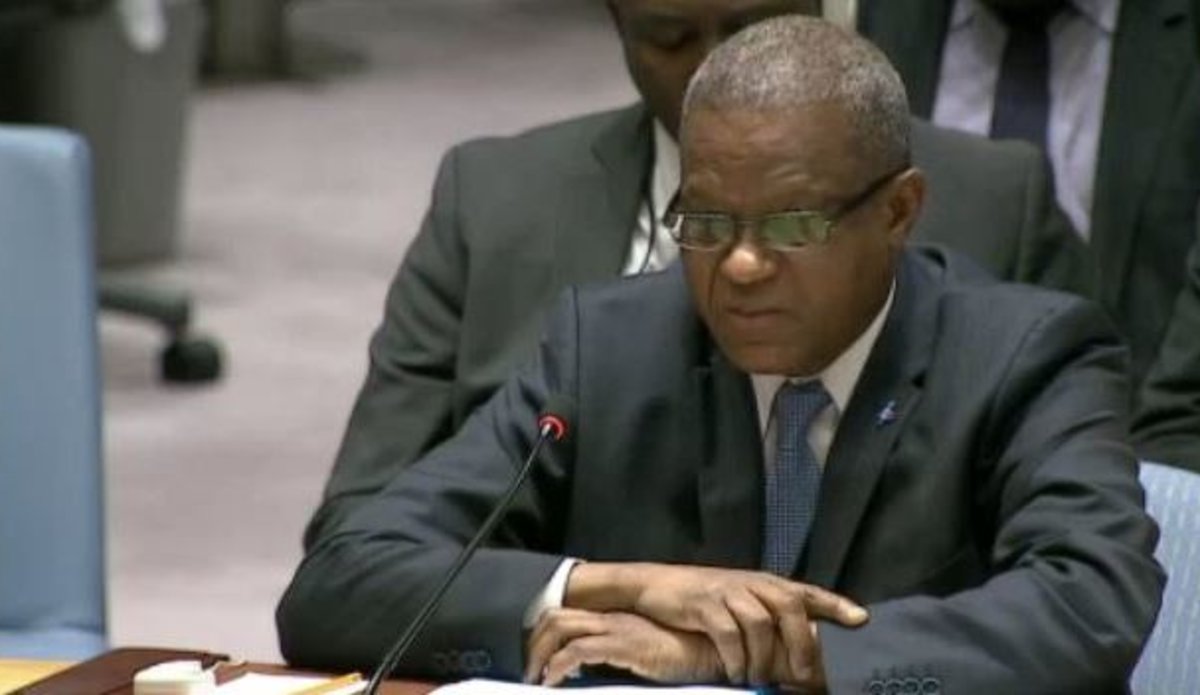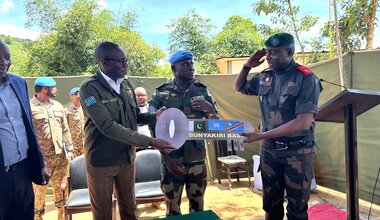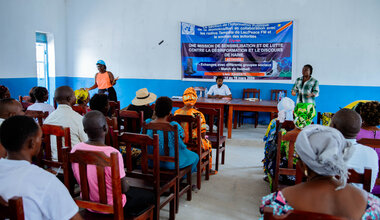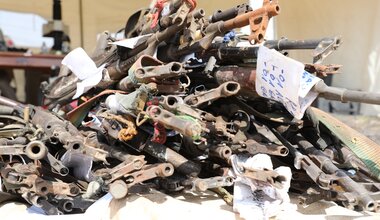Déclaration du Chef de la MONUSCO, Maman Sambo Sidikou, devant le Conseil de sécurité des Nations Unies
11 October 2016
Monsieur le Président,
Distingués membres du Conseil de sécurité,
Je vous remercie de l'opportunité qui m'est offerte de vous entretenir sur la situation en République démocratique du Congo (RDC). Je concentrerai mon propos sur la situation politique, sécuritaire et humanitaire, les défis auxquels la RDC est confrontée, et l'appui que le Conseil de sécurité pourrait apporter aux efforts collectifs de la Mission de l'Organisation des Nations Unies pour la stabilisation en République démocratique du Congo (MONUSCO) et des partenaires internationaux et régionaux.
Monsieur le Président,
La situation politique demeure extrêmement fragile en RDC, ce qui contribue aux tensions accrues, à une réduction continue de l’espace politique et à un risque très réel de voir la situation se dégrader davantage. Malgré les efforts déployés par le Facilitateur nommé par l'Union Africaine, Monsieur Edem Kodjo, et le soutien continu des Nations Unies et de la communauté internationale à ses efforts, les avancées dans le dialogue national ont été limitées, même si récemment nous entendons que les choses pourraient évoluer assez vite, dans le bon sens. En septembre, Monsieur Kodjo a présenté une proposition aux fins d’examen par les parties afin de parvenir à un accord sur (i) la durée d'une transition politique et le rôle du Président sortant au-delà de la période intérimaire; (ii) la configuration d’un gouvernement de transition et les portefeuilles clés ; et (iii) la date pour la tenue de l’élection présidentielle. Cependant, en raison du boycott du dialogue national par la coalition de l'opposition dénommée le Rassemblement et plus récemment le retrait de l’organisation épiscopale la CENCO du dialogue, un accord sur ces questions n’a pas pu être dégagé. Par ailleurs, le processus du dialogue est moins inclusif que l’on aurait souhaité.
Au cours de l'une des assises du dialogue national, la Commission électorale nationale indépendante (CENI) a indiqué que la tenue des élections présidentielle, législatives et provinciales en un seul jour ne serait techniquement possible que le 18 novembre 2018, à la suite de l'enrôlement des électeurs qui devrait être achevé le 31 juillet 2017. Cette annonce a suscité de vives contestations de plusieurs partis politiques de l'opposition qui estiment que la CENI aurait été instrumentalisée dans le but de maintenir le Président Joseph Kabila au pouvoir au-delà de la limite du mandât présidentiel prévue par la Constitution. Le 4 octobre, le Rassemblement a tenu à Kinshasa un conclave dont les recommandations réitèrent entre autres l'appel à la démission du Président Kabila le 19 décembre 2016. Par ailleurs, le conclave a annoncé son intention d'organiser le 19 octobre prochain des manifestations politiques à travers le pays.
Mr. President,
Against this background of political polarization, serious violence erupted on 19 and 20 September following large-scale demonstrations in Kinshasa and elsewhere. The UN has confirmed the killing of at least 49 civilians in the clashes that took place, 38 by gunshot, others burned alive or killed by machete. More than 140 civilians were injured, and there are unconfirmed reports of dozens of other casualties. Four police officers were also killed -- allegedly by demonstrators -- during the clashes.
MONUSCO’s investigations have documented the involvement of both state and non-state actors. We have also documented the involvement of the Garde Republicaine in several instances of violence against civilians. There were hundreds of arrests reported, and more than 100 people were initially detained in a military camp before transfer to state courts. Unfortunately, in the immediate aftermath of the clashes, MONUSCO was denied access to detention centers, several hospitals and morgues, making confirmation of the casualties and arrests difficult.
Moreover, those demonstrations impacted the civil and political rights in other parts of the country, where demonstrators were also reportedly arbitrarily arrested and ill-treated by State agents.
While not directly related to the electoral context, the situation prevailing in Kananga, capital of Kasai Central Province, is also a serious matter of concern with several clashes between militiamen affiliated to a traditional leader, including child soldiers, and State actors, which impede on the human rights of the civilian population, including children’s rights, causing widespread displacements. Here again, MONUSCO presence in Kananga is very limited and MONUSCO’s Force is not present on the ground which is an additional risk to the protection of civilians. Nonetheless, the Mission is actively monitoring the situation and has deployed a team of human rights and political affairs officers to better monitor, report on and analyze developments in the area. We have also engaged with political authorities, local leaders and civil society members to find a peaceful solution to this crisis.
For our part, we have consistently called for restraint on the part of all actors, including opposition members and I have personally raised our concerns about the role of state actors in the violence with my government interlocutors. Throughout the past months, I have worked with other stakeholders including the diplomatic community, civil society, and importantly the Church, to build bridges between the Facilitator, the Presidential Majority and Opposition groups. I have also liaised closely with the Government to take confidence-building measures to create the political space for dialogue, notably through the release of political prisoners and allowing media to operate without constraint.
The Mission has also reinforced its presence in Kinshasa with additional assets that will allow for greater presence and improved monitoring of the situation. The Mission will continue monitoring closely and reporting on the political, security and human rights situation. Also, MONUSCO will keep impressing upon the national authorities and security services the need to manage public order in accordance with the Constitution and international standards. An important effort will also continue to be dedicated to engaging all political actors on the need to find peaceful resolution to differences linked to the electoral process and the situation in the DRC.
Mr. President,
While much attention is currently focused on the political situation, I would like to highlight that the security situation in eastern DRC remains very worrying, characterized by severe protection of civilians risks to many communities. These tensions are only increasing through the electoral period.
In the Beni area, where a serious massacre had taken place in August, small-scale attacks on civilians by suspected ADF elements have continued in recent weeks. Violence in the broader northern Lubero area has contributed to a surge of displacement, with more than 100,000 people displaced in the last three months alone.
In this context, protection of civilians remains the highest priority of MONUSCO, one which requires every component of the Mission to play a role. Of critical importance is the ability of the Mission to act quickly and effectively to early warning threats of violence, based on a solid understanding of the dynamics of a given situation. In Beni, where protection threats are severe, MONUSCO has established a Joint Analysis Collection and Early Warning cell, which brings together civilian, police and force to provide cross-cutting analysis and direction to the Mission’s operations. This is a positive development that has already enhanced the Mission’s response and effectiveness. We are looking to further develop these capacities to support the Mission’s tailored strategies against all priority armed groups, including the newly mandated area of criminal networks in resolution 2277.
In support of these strategies, MONUSCO has continued to carry out military operations against armed groups, based on solid cooperation between the Force and the FARDC. In Eringeti, ongoing joint operations against ADF positions over the past several months have dislodged ADF elements from several key locations and allowed the FARDC, the Congolese army, to establish a more consistent presence in the affected areas. These operations against the ADF have seen the FARDC in the front lines, supported closely by MONUSCO. These operations have cleared key ADF camps in the so-called “triangle” area, and disrupted their operations and supply lines. The challenge ahead will now be to consolidate these gains, and assist the FARDC in building up its control in the area.
Robust peacekeeping requires a proactive approach, looking to deter violence before it happens. I believe this Council could usefully reinforce this message with troop contributing countries, as we continue to work together to make the Mission more effective in its protection mandate.
Mister President,
In the context of continued violence in eastern DRC, I would like to highlight an immediate concern with regard to the national DDR program. Following violence in the DDR camps in Kamina and Kitona over the summer, the Government initiated the return of more than 1,000 ex-combatants to communities in eastern DRC. While the reintegration of ex-combatants into communities is an essential part of the DDR process, this move was taken before the Government and the World Bank-funded partners had adequately prepared. Without sufficient sensitization and preparation, there is a risk that these ex-combatants may cycle back into armed groups, or exacerbate already high tensions in communities where they return. MONUSCO has worked to implement its community violence reduction program to support transition for ex-combatants back into civilian life. However, it is critical that the Government, the World Bank and implementing partners move quickly to put in place the necessary community reintegration measures if further returns from the camps are to take place in a constructive manner.
Mister President,
As I mentioned, population movements in eastern DRC in particular have increased the risks to already vulnerable communities. This has stretched already straining humanitarian delivery systems beyond their means. I am pleased to report that the humanitarian community has brought life-saving assistance to more than 3.5 million people this year, but this still falls far short of those in urgent need. Currently, the 2016 humanitarian appeal of 690 million dollars is only half funded. With continued displacements, an additional 350,000 refugees arriving from violence in South Sudan, and epidemics like the recent outbreak of cholera, we expect the needs to continue to grow in 2017. I hope this Council will join me in urging for greater support to those most in need in the DRC.
Mister President,
The Democratic Republic of Congo has entered a period of extreme risk to its stability. The electoral crisis has become a constitutional crisis, with deepening political polarization and no immediate resolution in sight. Actors on all sides appear more and more willing to resort to violence to achieve their ends, while the space for constructive political activity has shrunk still further. If this trajectory continues, I believe large-scale violence is all but inevitable. And while MONUSCO will do everything it can within its mandate to protect civilians, the scope of the threats dramatically outstrip the Mission’s capabilities.
The only solution is for the parties to re-engage in an inclusive process that charts a peaceful path forward for the country. I have remained actively engaged with all of the national, regional and international partners or stakeholders, and I believe there is a chance for the key parties to come together in a credible, inclusive manner. However, they will not do so without strong engagement by all of us, including this Council.
Specifically, I hope this Council will speak collectively and individually to reinforce the following key messages:
- The Rassemblement of the opposition and other key stakeholders currently boycotting should be encouraged to return to the dialogue process;
- The Government should be encouraged to undertake direct confidence-building measures with the opposition, including steps to ensure the rights of peaceful political activity are preserved and direct engagement, namely between President Kabila and the leadership of the Rassemblement (Mr. Tshisekedi);
- There should be no impunity for any actor perpetrating political violence; and,
- The regional organizations, that is, the African Union, SADC, ICGLR, and ECCAS, working in close consultation with the United Nations need to engage more directly, including through efforts to designate a high level emissary to help bridge the political divide.
En conclusion, Monsieur le Président, je voudrais souligner que la période à venir sera presque certainement très difficile. Le point de bascule dans la violence grave peut être atteint très rapidement. Je crois que ce Conseil devrait rester activement saisi de la situation et éventuellement chercher à échanger régulièrement avec le leadership du Secrétariat des Nations Unies et de la MONUSCO dans les prochains mois. Je vous suis très reconnaissant de l'opportunité qui m'a été donnée de porter à votre connaissance certaines observations sur la situation en RDC et espère que nous pourrons, ensemble avec le peuple congolais, tracer une voie plus positive pour le pays.
Je vous remercie.
 ONU
ONU Nations Unies Maintien de la paix
Nations Unies Maintien de la paix





